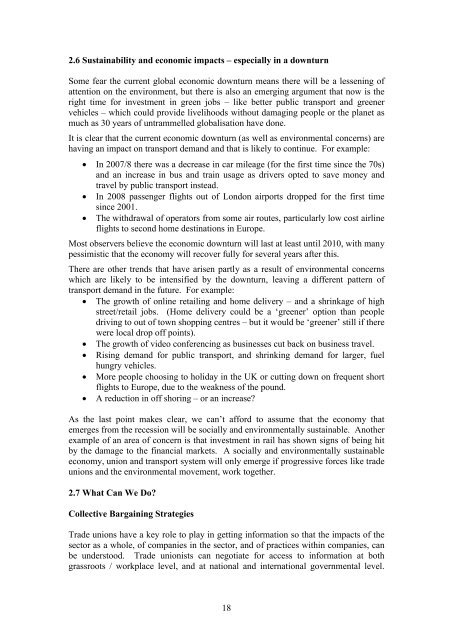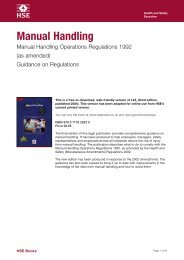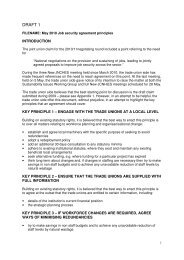Sustainable Transport and the Environment Guide - Unite the Union
Sustainable Transport and the Environment Guide - Unite the Union
Sustainable Transport and the Environment Guide - Unite the Union
Create successful ePaper yourself
Turn your PDF publications into a flip-book with our unique Google optimized e-Paper software.
2.6 Sustainability <strong>and</strong> economic impacts – especially in a downturn<br />
Some fear <strong>the</strong> current global economic downturn means <strong>the</strong>re will be a lessening of<br />
attention on <strong>the</strong> environment, but <strong>the</strong>re is also an emerging argument that now is <strong>the</strong><br />
right time for investment in green jobs – like better public transport <strong>and</strong> greener<br />
vehicles – which could provide livelihoods without damaging people or <strong>the</strong> planet as<br />
much as 30 years of untrammelled globalisation have done.<br />
It is clear that <strong>the</strong> current economic downturn (as well as environmental concerns) are<br />
having an impact on transport dem<strong>and</strong> <strong>and</strong> that is likely to continue. For example:<br />
In 2007/8 <strong>the</strong>re was a decrease in car mileage (for <strong>the</strong> first time since <strong>the</strong> 70s)<br />
<strong>and</strong> an increase in bus <strong>and</strong> train usage as drivers opted to save money <strong>and</strong><br />
travel by public transport instead.<br />
In 2008 passenger flights out of London airports dropped for <strong>the</strong> first time<br />
since 2001.<br />
The withdrawal of operators from some air routes, particularly low cost airline<br />
flights to second home destinations in Europe.<br />
Most observers believe <strong>the</strong> economic downturn will last at least until 2010, with many<br />
pessimistic that <strong>the</strong> economy will recover fully for several years after this.<br />
There are o<strong>the</strong>r trends that have arisen partly as a result of environmental concerns<br />
which are likely to be intensified by <strong>the</strong> downturn, leaving a different pattern of<br />
transport dem<strong>and</strong> in <strong>the</strong> future. For example:<br />
The growth of online retailing <strong>and</strong> home delivery – <strong>and</strong> a shrinkage of high<br />
street/retail jobs. (Home delivery could be a ‘greener’ option than people<br />
driving to out of town shopping centres – but it would be ‘greener’ still if <strong>the</strong>re<br />
were local drop off points).<br />
The growth of video conferencing as businesses cut back on business travel.<br />
Rising dem<strong>and</strong> for public transport, <strong>and</strong> shrinking dem<strong>and</strong> for larger, fuel<br />
hungry vehicles.<br />
More people choosing to holiday in <strong>the</strong> UK or cutting down on frequent short<br />
flights to Europe, due to <strong>the</strong> weakness of <strong>the</strong> pound.<br />
A reduction in off shoring – or an increase?<br />
As <strong>the</strong> last point makes clear, we can’t afford to assume that <strong>the</strong> economy that<br />
emerges from <strong>the</strong> recession will be socially <strong>and</strong> environmentally sustainable. Ano<strong>the</strong>r<br />
example of an area of concern is that investment in rail has shown signs of being hit<br />
by <strong>the</strong> damage to <strong>the</strong> financial markets. A socially <strong>and</strong> environmentally sustainable<br />
economy, union <strong>and</strong> transport system will only emerge if progressive forces like trade<br />
unions <strong>and</strong> <strong>the</strong> environmental movement, work toge<strong>the</strong>r.<br />
2.7 What Can We Do?<br />
Collective Bargaining Strategies<br />
Trade unions have a key role to play in getting information so that <strong>the</strong> impacts of <strong>the</strong><br />
sector as a whole, of companies in <strong>the</strong> sector, <strong>and</strong> of practices within companies, can<br />
be understood. Trade unionists can negotiate for access to information at both<br />
grassroots / workplace level, <strong>and</strong> at national <strong>and</strong> international governmental level.<br />
18
















